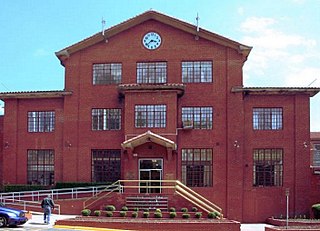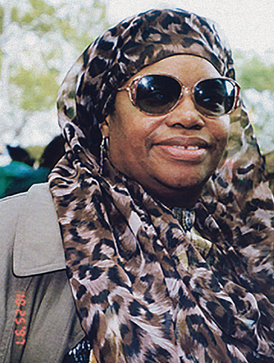
Mumia Abu-Jamal is an American political activist and journalist who was convicted of murder and sentenced to death in 1982 for the 1981 murder of Philadelphia police officer Daniel Faulkner. While on death row, he has written and commented on the criminal justice system in the United States. After numerous appeals, his death penalty sentence was overturned by a federal court. In 2011, the prosecution agreed to a sentence of life imprisonment without parole. He entered the general prison population early the following year.

In the United States, capital punishment is a legal penalty throughout the country at the federal level, in 27 states, and in American Samoa. It is also a legal penalty for some military offenses. Capital punishment has been abolished in 23 states and in the federal capital, Washington, D.C. It is usually applied for only the most serious crimes, such as aggravated murder. Although it is a legal penalty in 27 states, 20 states currently have the ability to execute death sentences, with the other seven, as well as the federal government, being subject to different types of moratoriums.

Capital punishment is a legal punishment under the criminal justice system of the United States federal government. It is the most serious punishment that could be imposed under federal law. The serious crimes that warrant this punishment include treason, espionage, murder, large-scale drug trafficking, or attempted murder of a witness, juror, or court officer in certain cases.

Capital punishment is a legal penalty in the U.S. state of Texas for murder, and participation in a felony resulting in death if committed by an individual who has attained or is over the age of 18.
McCleskey v. Kemp, 481 U.S. 279 (1987), is a United States Supreme Court case, in which the death sentence of Warren McCleskey for armed robbery and murder was upheld. The Court said the "racially disproportionate impact" in the Georgia death penalty indicated by a comprehensive scientific study was not enough to mitigate a death penalty determination without showing a "racially discriminatory purpose." McCleskey has been described as the "most far-reaching post-Gregg challenge to capital sentencing."

Gary Tyler, from St. Rose, Louisiana, is an African-American man who is a former prisoner at the Louisiana State Prison in Angola, Louisiana. He was convicted of the October 7, 1974 shooting death of a white 13-year-old boy and the wounding of another, on a day of violent protests by whites against black students at Destrehan High School in St. Charles Parish, Louisiana. He was tried as an adult and convicted of first-degree murder at age 17 by an all-white jury; he received the mandatory death sentence for that crime, according to state law. When he entered Louisiana State Prison (Angola), he was the youngest person on death row.
The 39th District Corruption Scandal refers to a persistent pattern of brutality and corruption among a cadre of Philadelphia Police Department officers, primarily from the Department's 39th District. The scandal emerged in late 1995 and received nationwide attention by 1997, eventually resulting in an investigation by Human Rights Watch. Hundreds of people were involved in the incidents that occurred in North Philadelphia in the early 1990s. Some individuals are notable due to their direct participation, and others for their participation in related events, particularly the legal proceedings of the conviction of Mumia Abu-Jamal for the murder of Officer Daniel Faulkner.
Arnold Beverly is a Philadelphia man who rose to prominence during the legal appeals following the 1982 trial of Mumia Abu-Jamal. In 1999, Beverly signed an affidavit confessing to the murder of police officer Daniel Faulkner. Beverly swore that while acting as a hitman for the mob hired by corrupt Philadelphia police officers, he, not Abu-Jamal, killed officer Faulkner.

Commonwealth of Pennsylvania v. Mumia Abu-Jamal was a 1982 murder trial in which Mumia Abu-Jamal was tried for the first-degree murder of police officer Daniel Faulkner. A jury convicted Abu-Jamal on all counts and sentenced him to death.

The Alabama Department of Corrections (ADOC) is the agency responsible for incarceration of convicted felons in the state of Alabama in the United States. It is headquartered in the Alabama Criminal Justice Center in Montgomery.

In Prison My Whole Life is a 2007 documentary film about American journalist and prisoner Mumia Abu-Jamal, directed by Marc Evans, and written by Evans and William Francome. Others involved with the project were Robert R. Bryan, Angela Davis, Anthony Arnove, Dead Prez, Howard Zinn, Mos Def, Noam Chomsky, Robert Meeropol, Russell Simmons, Snoop Dogg and Steve Earle. The film's executive producer is Colin Firth.
Mumia Abu-Jamal: A Case for Reasonable Doubt? is a documentary film about journalist Mumia Abu-Jamal and his trial for murder of a Philadelphia police officer, produced and directed by John Edginton. There are two versions, both produced by Otmoor Productions. The first version was 57 minutes long and aired in 1996 by HBO.
A polarizing figure, Mumia Abu-Jamal has attracted widespread attention in popular culture. Since at least 1995, there are examples of references to him in notable popular music recordings and musical performances. He and his case have been the subject of three documentary films and a shorter 20/20 television special which aired shortly after the 27th anniversary of his apprehension.
Vincent Alfred Simmons is an American man who was a life prisoner at Angola State Prison in Louisiana, where he was sentenced to 100 years in July 1977 after being convicted of the "attempted aggravated rapes" of 14-year-old twin sisters Karen and Sharon Sanders of Marksville. Simmons has maintained his innocence throughout. By 1999 Simmons had filed numerous habeas corpus writs, but had not gained an evidentiary hearing by a Louisiana court. After receiving a copy of his evidence file in 1993, he had found that it contained exculpatory evidence that was not given to his court-appointed attorney by the District Attorney, and that there were inconsistencies in reports and statements of victims and witnesses.
Marcus Reymond Robinson was an African-American convicted and sentenced to death in Cumberland County Superior Court for the June 1991 death of Erik Tornblom. Robinson also was sentenced to 40 years in prison for robbery with a dangerous weapon, 10 years for larceny and five years for possessing a weapon of mass destruction. In April 2012, he successfully appealed against the death sentence under North Carolina's 2009 Racial Justice Act which allowed for a prisoner under sentence of death to appeal for the sentence to be commuted to life imprisonment if racism is proven to be a factor in the original trial. North Carolina Superior Court judge Gregory Weeks found that the Act was applicable in Robinson's case after his lawyers cited a study from Michigan State University indicating that qualified black jurors were systemically excluded from jury service, both generally in North Carolina and at Robinson's trial. Consequently, Weeks ordered his removal from death row. Robinson was the first death row inmate to use the legislation.
Racial biases are a form of implicit bias, which refers to the attitudes or stereotypes that affect an individual's understanding, actions, and decisions in an unconscious manner. These biases, which encompass unfavorable assessments, are often activated involuntarily and without the awareness or intentional control of the individual. Residing deep in the subconscious, these biases are different from known biases that individuals may choose to conceal for the purposes of social and/or political correctness. Police officers have implicit bias, regardless of their ethnicity. Racial bias in criminal news reporting in the United States is a manifestation of this bias.
Alvaro Luna Hernandez is a Chicano liberation and prison abolition activist from Alpine, Texas. He is currently serving a 50-year sentence for aggravated assault of a police officer. He is housed at McConnell Unit prison. He spends his time as "Jailhouse Lawyer", also known as an amateur attorney, assisting indigent inmates he believes to be innocent or deserving in their pursuit of justice.

Safiya Bukhari was an American member of the Black Panther Party. She was also the co-founder of the Free Mumia Abu-Jamal Coalition (NYC), the Jericho Movement for U.S. Political Prisoners and Prisoners of War, and was the vice president of the Republic of New Afrika.
Abdul Rahim bin Shapiee was a Singaporean Uber driver who faced capital punishment in Singapore for trafficking of 41.24g of heroin. After his arrest on 3 August 2015, Abdul Rahim, who was also charged with consuming drugs, was convicted in March 2018 and despite the prosecution's acknowledgement of his role as a courier and himself having provided substantive assistance to the authorities, Abdul Rahim still received the death penalty since he had performed duties that exceeded that of a mere drug runner. After failing to overturn his sentence through appeal, Abdul Rahim was hanged on 5 August 2022. One of his two accomplices, Ong Seow Ping, was also arrested and executed for drug trafficking, and the other was serving a life sentence for the same offence.

On April 26, 1987, Kerrick Majors, a 14-year-old African-American boy, was tortured and murdered by three white drifters during a racially motivated hate crime in East Nashville, Tennessee. Majors was attacked by the trio after he and his friends accidentally broke a $2 vase at a flea market. Majors was kidnapped, tortured, beaten, and stabbed to death, while his attackers yelled racial slurs at him. His body was found the following day.









